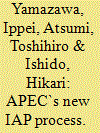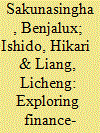| Srl | Item |
| 1 |
ID:
125273


|
|
|
|
|
| Publication |
2013.
|
| Summary/Abstract |
In Order to fulfill the leaders` commitment 2010, all APEC economics have renews their IAP process under new guideline. An academic assessment of the efforts to achieve the Bogor goals in 2020 leads to the following question: How have they implemented in their IAPs the Bogor Goals progress report guideline adopted last year? How much have they achieved towards the Bogor Goals at the current stage? In which areas do they need to strengthen their implementation? This article seeks to objectively assess individual economics by individual area so that their remaining tasks will be clarified, although the mid-term assessment of 2010 adopted a group assessment of the thirteen economics, This paper makes an overall assessment and recommendations to the APEC SOM (Senior Office Meeting) regarding how to strengthen the new IAP process.
|
|
|
|
|
|
|
|
|
|
|
|
|
|
|
|
| 2 |
ID:
192856


|
|
|
|
|
| Summary/Abstract |
This study explores the finance-specific factors that help domestic companies operating in Thailand receive foreign direct investment (FDI) related to mergers and acquisitions (M&A). The three main objectives of this paper are to: analyse whether the firms receiving FDI differ from those that do not; identify significant finance-specific determinants that make Thai companies more likely to receive foreign investment; and explore the heterogeneity (different responses to investment decisions) at the firm-level, and the impact of financial constraints. This research makes use of the operational and financial data of both listed and unlisted Thai companies over the 2012–20 period and finds that larger as well as younger firms draw more foreign attention and have a higher probability of receiving M&A type of FDI. Moreover, companies with substantial intangible assets attract more investments from abroad. These findings have practical implications for business policies related to the accumulation of intangible assets. Specifically, developing flexible formal/informal linkages with potential M&A partners is key to promoting M&A-type FDI.
|
|
|
|
|
|
|
|
|
|
|
|
|
|
|
|
| 3 |
ID:
184216


|
|
|
|
|
| Summary/Abstract |
This research investigates the significance of technological innovation for Thailand's industrial development through equity participation in the form of foreign direct investment (FDI). The pecking order theory suggests that to finance technological upgrading, firms tend to prioritize internal funding, and use debt and equity financing as the last resort. In the context of incessant technological change, however, equity financing might be a better choice. This research highlights some aspects of how that is the case by analysing firm-level performance data from Thailand and then conducting in-depth interviews with top executives from several companies located in the Eastern Economic Corridor (EEC). We find that the conventional pecking order theory does not hold when it comes to external financing decisions. The interview insights reveal that, while a majority of companies prioritize internal financing, capturing technology (as intangible assets) via equity as well as non-equity linkages with foreign firms is also observed. Given that technological upgrading can result from FDI inflows by foreign firms, a truly "joint" nature of equity and non-equity forms of investment projects would serve as a win-win option for Thai and foreign firms, especially under the "Thailand 4.0" policy framework.
|
|
|
|
|
|
|
|
|
|
|
|
|
|
|
|